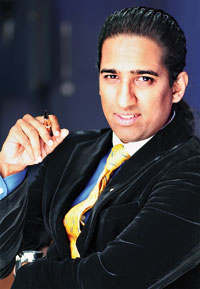 For almost a decade, Dr Manmohan Singh has failed to deliver the goods when it comes to decent economic policy making governed by common sense. Given his background and past experience, this has come as an unpleasant surprise to all Indians. This coming budget is perhaps his last opportunity to stamp his authority and secure his place in history. He can still remain silent; but his policies must do the talking for him “The art of leadership is saying no, not saying yes. It is very easy to say yes.”
“Leadership is about solving problems. The day soldiers stop bringing you their problems is the day you have stopped leading them. They have either lost confidence that you can help or concluded that you do not care. Either is a failure of leadership.”“This light of history is pitiless; it has a strange and divine quality that, luminous as it is, and precisely because it is luminous, often casts a shadow just where we saw a radiance; out of the same man it makes two different phantoms, and the one attacks and punishes the other, the darkness of the despot struggles with the splendor of the captain. Hence a truer measure in the final judgment of the nations. Babylon violated diminishes Alexander; Rome enslaved diminishes Caesar; massacred Jerusalem diminishes Titus. Tyranny follows the tyrant. Woe to the man who leaves behind a shadow that bears his form.”This is the thirteenth time in 13 years that I am starting the presentation of my Alternative Budget. Yes, my friends and dear readers, it has been 13 years since I first presented a set of suggestions to the then Union finance minister and branded it as an Alternative Budget (of course Dr. Malay Chaudhuri – the Founder Director of IIPM – had been writing budget alternatives for many years before that and our jointly authored book, The Great Indian Dream, also deals with the same in a great detail). There have been a few, rare occasions when finance ministers have unveiled proposals that have made me hopeful about the future of India. On most occasions, the budgets have been a series of fatuous statements and flogged-to-death proposals that have done virtually nothing to make a difference to the fundamental problems that confront India. But I don’t need to repeat and rehash a list of those proposals since every Indian with some knowledge of economics and some common sense knows that budgets have been a spectacular and persistent failure when it comes to solving India’s problems. Read More.... An Initiative of IIPM, Malay Chaudhuri and Arindam Chaudhuri ( Renowned Management Guru and Economist). For More IIPM Info, Visit below mentioned IIPM articles SC slams AICTE's illicit control on MBA coursesMBA, MCA courses no longer under AICTE 2012 : DNA National B-School Survey 2012
Ranked 1st in International Exposure (ahead of all the IIMs)
Ranked 6th OverallZee Business Best B-School Survey 2012 Prof. Arindam Chaudhuri’s Session at IMA IndoreIIPM IN FINANCIAL TIMES, UK. FEATURE OF THE WEEK IIPM strong hold on Placement : 10000 Students Placed in last 5 yearIIPM’s Management Consulting Arm-Planman ConsultingProfessor Arindam Chaudhuri – A Man For The Society….IIPM: Indian Institute of Planning and ManagementIIPM makes business education truly global
Management Guru Arindam Chaudhuri
Rajita Chaudhuri-The New Age Woman
IIPM B-School Facebook Page
IIPM Global Exposure
IIPM Best B School India
IIPM B-School Detail IIPM LinksIIPM : The B-School with a Human Face------------------------------------------------------------------------
I had too busy a schedule and was not planning to watch television when the Gujarat election results were supposed to be declared. But my colleagues insisted that I must watch at least some news channel, even if just for entertainment! So I sat in front of the TV; and while surfing channels, I saw a lot of important journalists and analysts on Times Now and decided to stay there for a while. Honestly, I could not but help a Bangla expletive escape my mouth when I heard what some experts were saying. One was saying that Narendra Modi and his electoral victory was against the Constitution of India. Another was saying how the Gujarat verdict goes against the spirit of India and how the Idea of India is in danger. I always thought free and fair elections were a celebration of the Constitution, democracy and the Idea of India. So what was all this nonsense talk all about? The more I watched and the more I followed analysts in other news channels, I realized something simple: these individuals were very unhappy that Modi had won and they clearly would have preferred his loss. I also realized they hate him in a very irrational manner. For example, one person went on and on about how Modi is bad because he encourages a personality cult that revolves around Modi. Interestingly, nobody in that particular news panel found time to mention how more than 60 welfare schemes of the government are named after the Gandhi family. If that is not personality cult, what is? Someone else in some channel said that Modi is dictatorial and doesn’t allow any leader or voice to prosper under him. Then I thought, what is Congress if not dictatorial? Can any chief minister of any Congress-ruled state defy the central leadership the way Modi has repeatedly done? What will be the Congress minister’s fate if that happens? For that matter, I honestly think that at least some of the young Congress leaders – ranging from Sachin Pilot to Jyotiraditya Scindia to Milind Deora and some others – are better equipped to handle India than Rahul Gandhi. But not a single panelist in any TV channel was saying any of this. So let us sum up something: the first thing is that most English media types absolutely hate Narendra Modi. That is all right. Even journalists have every right to hate someone. But I wondered how Modi’s victory could destroy India, the way so many senior journalists were complaining. So I asked my colleagues to note down the reasons why the English journalists hate Modi. The results were interesting. The first reason was that Modi is anti-Muslim and communal. The related reason was that Modi has apparently never apologized for the 2002 riots. The second reason was that he is interested only in projecting himself. The third reason was that he is supposedly a dictator and a fascist. And the fourth reason was that his claims of a developed Gujarat are, the journalists claim, hollow. Read more....
An Initiative of IIPM, Malay Chaudhuri and Arindam Chaudhuri ( Renowned Management Guru and Economist). For More IIPM Info, Visit below mentioned IIPM articles SC slams AICTE's illicit control on MBA coursesMBA, MCA courses no longer under AICTE 2012 : DNA National B-School Survey 2012
Ranked 1st in International Exposure (ahead of all the IIMs)
Ranked 6th OverallZee Business Best B-School Survey 2012 Prof. Arindam Chaudhuri’s Session at IMA IndoreIIPM IN FINANCIAL TIMES, UK. FEATURE OF THE WEEK IIPM strong hold on Placement : 10000 Students Placed in last 5 yearIIPM’s Management Consulting Arm-Planman ConsultingProfessor Arindam Chaudhuri – A Man For The Society….IIPM: Indian Institute of Planning and ManagementIIPM makes business education truly global
Management Guru Arindam Chaudhuri
Rajita Chaudhuri-The New Age Woman
IIPM B-School Facebook Page
IIPM Global Exposure
IIPM Best B School India
IIPM B-School Detail IIPM LinksIIPM : The B-School with a Human Face------------------------------------------------------------------------
Today, India is at a critical juncture with all socio-economic as well as political ills engulfing the nation from almost all possible directions. Starting from a series of bribery scams that are being exposed, to our plummeting ranks in almost all economic indicators – everything corroborates the hope for the rise of a fourth front (considering the third front still exists and is potent) in the form of Arvind Kejriwal’s political debut with India Against Corruption, along with an emerging coterie of social activists, who are gradually morphing the political landscape and are all collectively reshaping the political couture of the nation. Without even an iota of apprehension, Kejriwal has been able to create a wave of passion and excitement among common Indians for a probable better political future. Through his campaign against political parties and leaders, he has been instrumental in giving a vent to the pent up anger of the public against the corrupt, inefficient and slothful political outfits. However, the top brass of such parties can get their feet wet and get away with it, because even today, there is a dearth of intra-party democracy in almost all political parties in India. This very opacity guards the elite big bosses of the parties, who thus can never be replaced from their esteemed chairs, which eventually provides an incubation environment to corruption, favouritism and intra-party dictatorship. The most potent example of such perceived bravado is the Indian National Congress’s obsession with the Nehru-Gandhi family, whose grip on the party is absolute. Therefore, despite the Congress party and their allies getting embroiled in one expose’ after another involving multibillion bucks, no eyebrows are raised and no fingers are pointed against its leadership from within. None of the Congress members have ever demanded explanations or enquires for the series of scams. The same is true for almost all political parties, except a few... in fact, except too few – which again is a temporary phenomenon. The dictatorial and dynastic rule of political parties is endemic to India; it is just the baton that gets passed from generation to generation. The root cause for such a contest of attrition of democracy is that our Constitution does not enforce a structure for inner-party democracy and does not account for the fact that the electorate should have the right to choose the leader of every political party. This very loophole of our Constitution is undermined and exploited by almost every political party, who treat their fiefdom as a new business venture to stash up piles of cash and benefit their personal interest. Consequently, the recruitment and development of party members are not based on competencies but rather on loyalty and lobbying. Read more....An Initiative of IIPM, Malay Chaudhuri and Arindam Chaudhuri ( Renowned Management Guru and Economist). For More IIPM Info, Visit below mentioned IIPM articles SC slams AICTE's illicit control on MBA coursesMBA, MCA courses no longer under AICTE 2012 : DNA National B-School Survey 2012
Ranked 1st in International Exposure (ahead of all the IIMs)
Ranked 6th OverallZee Business Best B-School Survey 2012 Prof. Arindam Chaudhuri’s Session at IMA IndoreIIPM IN FINANCIAL TIMES, UK. FEATURE OF THE WEEK IIPM strong hold on Placement : 10000 Students Placed in last 5 yearIIPM’s Management Consulting Arm-Planman ConsultingProfessor Arindam Chaudhuri – A Man For The Society….IIPM: Indian Institute of Planning and ManagementIIPM makes business education truly global
Management Guru Arindam Chaudhuri
Rajita Chaudhuri-The New Age Woman
IIPM B-School Facebook Page
IIPM Global Exposure
IIPM Best B School India
IIPM B-School Detail IIPM LinksIIPM : The B-School with a Human Face------------------------------------------------------------------------
That Congress is digging its own grave is too apparent. That it is a party full of unbelievably corrupt is also something that is established in public perception. And that win-or-lose, Arvind Kejriwal has been the man responsible for giving the maximum dent to Congress’ image in its entire history is also established! However, what is most amusing is how, during this entire fall and fall of Congress in public perception, BJP has remained a mute spectator, gaining nothing out of the whole issue. In fact, they have been also busy digging their own grave! Every time a state-level leader with a mass following becomes powerful in BJP and acquires a stature, the big guys in Delhi seem to be too intent to kill that rise. Look at what happened to Kalyan Singh, the low-caste leader who actually helped BJP win a majority – the first and only time – in UP. He was thrown out. Look at what happened to Uma Bharti, the lady who unseated and threw out popular Digvijay Singh from power in MP. She too was eventually thrown out. Look at how they have treated Vasundhara Raje, the lady who won them Rajasthan. She has been humiliated. Look at Yeddyurappa – conceded he has been corrupt, but he was the man who won Karnataka for the BJP... He has also been effectively thrown out. And the worst of all, look at Narendra Modi, where those are BJP leaders from Delhi who have spread rumours that he is not a fit candidate to be PM. Strange indeed are the ways of BJP wherein Raman Singh and Shivraj Singh are the only two who seem to have understood the art of staying alive in the party by not showing their might around too much! It seems that some Delhi-based BJP leaders, who apparently can win the maximum Rajya Sabha elections, are dictating terms in the party, which – unlike the Congress – seemed to be having inner party democracy in reality. For a fact, BJP is not a mother-and-son or father-and-daughter party, where anything and everything can be manipulated. However, the Delhi-based few apparently have become masters at manipulating the Delhi-based 24x7 media – which lives on hysteria and worse – and having their way. Thus, in the middle of all the Congress-bashing – when Kejriwal was in a hurry to prove that he was not a BJP man and therefore, without finishing off his Robert Vadra issue, went looking for something against BJP – Gadkari seemed to have become the collateral damage! Read More....An Initiative of IIPM, Malay Chaudhuri and Arindam Chaudhuri ( Renowned Management Guru and Economist). For More IIPM Info, Visit below mentioned IIPM articles SC slams AICTE's illicit control on MBA coursesMBA, MCA courses no longer under AICTE 2012 : DNA National B-School Survey 2012
Ranked 1st in International Exposure (ahead of all the IIMs)
Ranked 6th OverallZee Business Best B-School Survey 2012 Prof. Arindam Chaudhuri’s Session at IMA IndoreIIPM IN FINANCIAL TIMES, UK. FEATURE OF THE WEEK IIPM strong hold on Placement : 10000 Students Placed in last 5 yearIIPM’s Management Consulting Arm-Planman ConsultingProfessor Arindam Chaudhuri – A Man For The Society….IIPM: Indian Institute of Planning and ManagementIIPM makes business education truly global
Management Guru Arindam Chaudhuri
Rajita Chaudhuri-The New Age Woman
IIPM B-School Facebook Page
IIPM Global Exposure
IIPM Best B School India
IIPM B-School Detail IIPM LinksIIPM : The B-School with a Human Face------------------------------------------------------------------------
Arvind Kejriwal’s series of attacks reminds me of a tale by Hans Christian Andersen, ‘The Emperor’s New Clothes’, where two weavers design a new attire for the emperor that, they tell the emperor, will be only visible to those who are honest and loyal. The emperor subsequently dons the ‘attire’ to test his subjects’ loyalty, much to the amusement of his citizenry. Arvind Kejriwal, like the child who laughed at the emperor and dared to shout that the emperor is actually parading naked, is ripping out the false masks from the faces of many such self-proclaimed political and corporate emperors and has dared to show their real faces to the world. Arvind Kejriwal’s storm of lethal revelations against the alleged corrupt political parties, Congress and BJP, has upset the tricky equations between the government and industry and their nexus that has been regularly facilitated by the incumbent parties. He has set the tone that is becoming increasingly uncomfortable and scary for mainstream political parties, who could have earlier afforded to patch-up over such common vices. It all started with the most coveted Robert Vadra. For years now, people in media and everyone else with an idea of things around, had been whispering about his deals. And it’s not just about DLF, but about many other big, realty companies! However, in spite of almost all real-estate owners and politicians being conversant with the Vadra-DLF knot, none ever tried to question this fixture. Arvind had the courage to come out with it in public and with proof! He reiterated that DLF granted favours to Robert Vadra wherein Vadra used black money worth Rs 500 crore to purchase properties. In return, DLF gave an interest-free loan of Rs 65 crore to Vadra and Co. Moreover, numerous discounted residential flats were gifted to Vadra and Co. in Gurgaon, Haryana. Given the fact that Vadra is closely ‘related’ with Congress, the party’s powers-that-be in Haryana gave land meant for public utilities (and from the green belt) to DLF with easy clearances for an express-lane as well. After Robert, Arvind went out to less significant exposés concerning Salman Khurshid and Nitin Gadkari – though strangely, while the Vadra case was buried by the media in a couple of days, and Khurshid’s in two more days, Nitin Gadkari’s relatively less consequential business deals are something the media seems to have taken an excessive liking for! While the other allegations concern misusing public money, Gadkari’s seem more of private business dealings. However, corruption is corruption. And the biggest storm that was unexpected in the corridors of crony capitalists came on October 31, 2012. In a press conference, the activist-turned-politician Kejriwal tagged the Reliance-politicians’ nexus as crony capitalism – again, this was something everyone was always speaking of – and pointed out how the entire political spectrum, not just Congress, extended undue favours to Reliance – of course, Congress in particular. All these parties are in fact – in Kejriwal’s articulation – in Mukesh Ambani’s pocket. The press release by Kejriwal’s India Against Corruption, published by many media houses, mentions, “RIL takes away more than 80% of profits and the government gets less than 20 per cent of profits.” Kejriwal also adds that Reliance gained Rs 1 lakh crore by plundering the country’s resources. He also accused Reliance of placing students in the Ministry of Petroleum and Natural Gas for their own benefits, and further accused RIL of selecting the Petroleum Minister. Read more....An Initiative of IIPM, Malay Chaudhuri and Arindam Chaudhuri ( Renowned Management Guru and Economist). For More IIPM Info, Visit below mentioned IIPM articles SC slams AICTE's illicit control on MBA coursesMBA, MCA courses no longer under AICTE 2012 : DNA National B-School Survey 2012
Ranked 1st in International Exposure (ahead of all the IIMs)
Ranked 6th OverallZee Business Best B-School Survey 2012 Prof. Arindam Chaudhuri’s Session at IMA IndoreIIPM IN FINANCIAL TIMES, UK. FEATURE OF THE WEEK IIPM strong hold on Placement : 10000 Students Placed in last 5 yearIIPM’s Management Consulting Arm-Planman ConsultingProfessor Arindam Chaudhuri – A Man For The Society….IIPM: Indian Institute of Planning and ManagementIIPM makes business education truly global
Management Guru Arindam Chaudhuri
Rajita Chaudhuri-The New Age Woman
IIPM B-School Facebook Page
IIPM Global Exposure
IIPM Best B School India
IIPM B-School Detail IIPM LinksIIPM : The B-School with a Human Face------------------------------------------------------------------------
These have been truly turbulent years. Between then and now, we have seen Mayawati sweep Uttar Pradesh and then lose it badly. Between then and now, India has miserably lost the Cricket World Cup and then won it handsomely. Between then and now, the Indian economy has changed from being a rampaging elephant to a caged tiger once again. Between then and now, the three Khans of Bollywood have further cemented their supremacy over the box office. Between then and now, Rahul Gandhi has been transformed from being the latest Great White Hope to a question mark and an enigma. Between then and now, the loot and plunder of natural resources through crony capitalism have gathered momentum. Between then and now, Ratan Tata has endured the disgrace of Singur to fade triumphantly into retirement. Between then and now, Mamata Didi has remained Mamata Didi... So much has happened over the last six years that it would require many multiple books to chronicle contemporary history. And my readers know I do not write history books :-) And yet, I have identified six major and defining trends of the last few years that will have a lasting impact on India for at least another decade. In no order of preference and importance, here is my list: 1: Good governance gets pro-incumbency verdicts:In 2005, when my team and I had started planning the launch of The Sunday Indian – after having launched Business & Economy and 4Ps Business & Marketing – Nitish Kumar narrowly failed to achieve his dream of becoming the Bihar Chief Minister. In 2006, when this magazine was launched, Nitish Kumar won a decisive verdict. In 2011, he won an even more decisive verdict. So much so that people are now openly talking of his ambitions to be Prime Minister. Ditto for Narendra Modi. Barring a miracle for the Congress, Modi is all set to win Gujarat for the third successive time. Like Nitish, he too is a contender for the post of Prime Minister. Sheila Dixit and Naveen Patnaik have already won three successive elections in Delhi and Odisha respectively. The incumbent Left Front in Kerala almost pulled off a shock victory over Congress last year, losing the assembly by just one seat. The Akali Dal-BJP combine achieved what was thought impossible: winning a second successive term in Punjab. And it does look like Shiv Raj Chauhan and Raman Singh will win their third successive elections in Madhya Pradesh and Chattisgarh next year. It is not as if all incumbent governments are winning. The DMK-Congress alliance was humiliated in Tamil Nadu last year; Mayawati lost badly in UP this year; the BJP lost Rajasthan in 2008; and the Congress was trounced in Goa this year. I really don’t need to add more. If the voter thinks you are delivering decent governance, you have her support. Read More....An Initiative of IIPM, Malay Chaudhuri and Arindam Chaudhuri ( Renowned Management Guru and Economist). For More IIPM Info, Visit below mentioned IIPM articles 2012 : DNA National B-School Survey 2012
Ranked 1st in International Exposure (ahead of all the IIMs)
Ranked 6th OverallZee Business Best B-School Survey 2012 Prof. Arindam Chaudhuri’s Session at IMA IndoreIIPM IN FINANCIAL TIMES, UK. FEATURE OF THE WEEK IIPM strong hold on Placement : 10000 Students Placed in last 5 yearIIPM’s Management Consulting Arm-Planman ConsultingProfessor Arindam Chaudhuri – A Man For The Society….IIPM: Indian Institute of Planning and ManagementIIPM makes business education truly globalManagement Guru Arindam ChaudhuriRajita Chaudhuri-The New Age Woman
IIPM B-School Facebook Page
IIPM Global Exposure
IIPM Best B School India
IIPM B-School Detail IIPM LinksIIPM : The B-School with a Human Face----------------------------------------------------------------------------------------------------------------------
It is the race of a lifetime. Who is most likely to be the Prime Minister of India in 2014? That is the billion rupee question that this issue of TSI seeks to answer. In an exclusive survey, Narendra Modi and Rahul Gandhi emerge as the two frontrunners. But by all accounts, it is going to be a close fight.
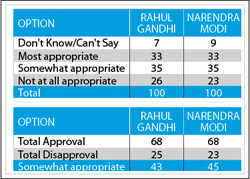 Rahul Gandhi and Narendra Modi are frontrunners for the Prime Minister's post in 2014. Would you say the two candidates are most appropriate, somewhat appropriate or not appropriate at all?
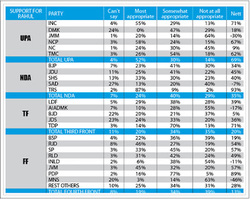 Support for Rahul Gandhi among supporters of different parties
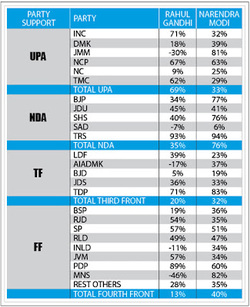 Net support for both leaders among supporters of different political parties
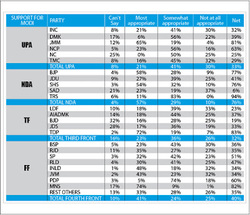 Support for Narendra Modi among supporters of different parties
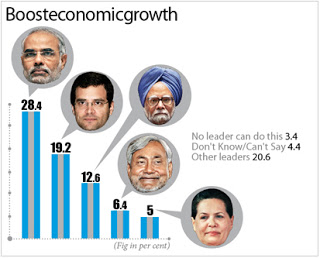 As Prime Minister, which politician according to you, would provide the most effective leadership to the country on the following issues:
Dear Muslim Brothers, I first thought of writing an open appeal to our Prime Minister Dr. Manmohan Singh. But then I realized that it would be worse than banging my head against a granite wall. I also thought of making an emotional appeal to the President of the Congress Sonia Gandhi and her son Rahul Gandhi. But then, people far more powerful, important and experienced than me have tried doing that. When I read about the riots in Assam, I was slightly perplexed. Why now? And then I was bewildered when riots broke out in Bareilly in Uttar Pradesh, a town that was spared communal violence and divide even at the peak of the Babri Masjid crisis. I was shocked when I saw visuals of a mob rampaging in Mumbai, desecrating and destroying even the Amar Jawan Jyoti. I was boiling with anger and helplessness by the time I read about how bona fide Indian citizens belonging to the Northeast felt so threatened that they were fleeing cities like Pune, Hyderabad, Bengaluru and Chennai. And I felt really bad when I saw pictures of a mob trying to destroy a statue of Buddha in Lucknow. These are truly dangerous times for India, perhaps even more dangerous than the 1980s when the Shah Bano and the Babri Masjid controversies eventually resulted in insane communal violence across the country. India had been spared the madness of communal riots since 2002. Suddenly, they loom again over India like a malevolent cloud. Predictably, the demoralized, dispirited and disgraced UPA government led by Manmohan Singh has sought to evade taking responsibility for this mess by blaming Pakistan for the mess. Apparently, morphed and false visuals of Muslims being allegedly persecuted and killed in Assam and Myanmar originated in Pakistan and were deliberately spread across India through social networking websites and text messages. That may be true. But my question is: is that justification for molesting lady constables, desecrating the Amar Jawan Jyoti, randomly attacking people from the north east and threatening them and also destroying a Buddha statue? This is where my blunt question to my Muslims brothers, who are also fellow Indians must be asked: why are you getting so worked up over the persecution of Muslims in Myanmar? Why are you not holding rallies and organising protests against the daily massacre of Muslims in countries like Syria? Why are you not protesting against the senseless manner in which Shias are being butchered in Pakistan? Even more important: is there any dearth of real problems that Muslims face in India, while they remain one of the most economically marginalized sections of the society? Read More....An Initiative of IIPM, Malay Chaudhuri and Arindam Chaudhuri ( Renowned Management Guru and Economist). For More IIPM Info, Visit below mentioned IIPM articles 2012 : DNA National B-School Survey 2012
Ranked 1st in International Exposure (ahead of all the IIMs)
Ranked 6th OverallZee Business Best B-School Survey 2012 Prof. Arindam Chaudhuri’s Session at IMA IndoreIIPM IN FINANCIAL TIMES, UK. FEATURE OF THE WEEK IIPM strong hold on Placement : 10000 Students Placed in last 5 yearIIPM’s Management Consulting Arm-Planman ConsultingProfessor Arindam Chaudhuri – A Man For The Society….IIPM: Indian Institute of Planning and ManagementIIPM makes business education truly globalManagement Guru Arindam ChaudhuriRajita Chaudhuri-The New Age Woman
IIPM B-School Facebook Page
IIPM Global Exposure
IIPM Best B School India
IIPM B-School Detail IIPM LinksIIPM : The B-School with a Human Face----------------------------------------------------------------------------------------------------------------------
My colleagues tell me that India changed decisively in 1982. I was in school so I don’t really remember the detailed newspaper headlines of those days. But I do know that the politics of Andhra Pradesh changed forever in 1982. Apparently, the then Chief Minister of AP T. Anjaiah wanted to pick up the slippers of Rajiv Gandhi. And history was made. Rajiv Gandhi was the anointed leader of Congress and somehow, fact or not, that gesture to please Rajiv Gandhi prompted a film star called NT Rama Rao to launch a movement and a party to reclaim Telugu pride. Rao and his Telugu Desam party swept the assembly elections in 1983. Cut to about 30 years down the line and you see something dramatically different; and yet dramatically similar. Despite the huge hype that surrounded the Congress campaign led by Rahul Gandhi, it is Akhilesh Yadav of a regional outfit called Samajwadi Party who has won. In 1982, when Rajiv Gandhi took over the reins, Tamil Nadu was the only major state where the Congress party had been pushed to the sidelines as a fringe player dependent on outfits like AIADMK for votes and seats. In 2012, as Rahul Gandhi takes over the party, Congress has become a fringe player in almost one third of India. Many political pundits and scholars are ascribing many reasons for this latest series of defeats confronting the Congress. Quite a few have gone on to say that the charisma of the Gandhi dynasty is irrevocably fading away. Some uncharitable analysts have even started questioning the credentials of the Congress General Secretary Rahul Gandhi to lead the party during 2014 Lok Sabha elections. I personally think it is too simplistic to start drawing such conclusions every time an election happens. In 2009, when the Congress won more than 200 seats in Lok Sabha elections and about 21 seats in Uttar Pradesh, everyone hailed Rahul Gandhi as a miracle man. Now, with such heavy defeats in the assembly elections, the same sets of people are writing off Rahul Gandhi. A better way would be to look at the undercurrents of change that have been sweeping across India since 1982; some very visible and noisy and some low profile and silent. These changes are what have made things more difficult for Rahul Gandhi than they were for his father Rajiv Gandhi in 1982. It is for Rahul Gandhi and his advisors to understand and interpret the significance of these changes if they want the Congress to perform well in 2014 and beyond. I would list 10 major changes that have transformed India between the Rajiv era of the Congress and the present Rahul era. A lot of these changes are interlinked and have reinforced each other, without a doubt making India a more mature democracy despite all its flaws and blemishes. 1. Everyone talks and writes about the miracle of Indian democracy; about how free and fair elections have always been a plus for the country. I personally don’t think Indian elections were always free and fair in the true sense of the term. Booth capturing and rigging were often the norm. In a state like West Bengal, rigging had been developed into a fine art. That was mainly because the Chief Election Commissioner of India and the Election Commission were often hesitant to challenge the power of money and muscle during elections. That was till a gentleman called T.N Seshan took over the Election Commission. It was T.N Seshan who actually started the process whereby the Election Commission became a truly independent body. Seshan ended up offending many political parties and even challenged many goons openly. So powerful was his impact that politicians actually tweaked the law to ensure India has three election commissioners at one time rather than one. But there is simply no doubt that a more independent and fearless election commission marks the difference between 1982 and 2012. The process has moved so far ahead that the commission now takes on even the media when it comes to the dirty practice of ‘paid news’. 2. Back in 1982, telephones were a luxury that only the rich or the powerful could afford. People had to book a trunk call and wait for hours for a conversation. And phone calls were terribly expensive. It often cost Rs 90 for a 3 minute telephone call between Mumbai and Delhi. But the communications revolution – many ascribe it to the original vision of Rajiv Gandhi – has completely changed India. Today, the country has more than 800 million mobile phone subscribers who are constantly interacting with each other not just through voice but also text, chat and many other ways. In just a few years, India will have more than 400 million active users of the internet. In contrast to the India of Rajiv Gandhi, today’s India is all about instant and continuous communication. Both good and bad news spread instantly and no political party can now claim a monopoly over communication channels. Till not too far back, Mulayam Singh Yadav was known for publicly asking for a ban on English and on computers. In these elections, his son Akhilesh Yadav actually promised computers and tablets to voters. That is the power of the communications revolution in India. 3. Along with the communications revolution, India has also witnessed an unprecedented revolution in media. Back in 1982, the whole of India was in a tizzy when Rajiv Gandhi announced the launch of colour televisions on the eve of the Asian Games. In 2012, more than 100 news channels are round-the-clock telecasting bad news for the Congress and analyzing the performance of Rahul Gandhi. There is no doubt that India has enjoyed a free media since 1947, but it is only the advent of electronic media and private news channels that has made a deep impact. No doubt, private news channels go overboard, but it is their relentless coverage of scams and scandals that has ensured that even Akhilesh Yadav publicly distances himself from an alleged bahubali like DP Yadav. You may recall that DP Yadav’s son has been convicted for the murder of Nitish Katara and no one can deny the role played by media in highlighting and following up this crime to its logical conclusion. Already, every major town in India has a local news channel and this process will deepen even further in the future. Read More.... For More IIPM Info, Visit below mentioned IIPM articles.
IIPM B-School Detail
IIPM makes business education truly global
IIPM’s Management Consulting Arm - Planman Consulting
Arindam Chaudhuri (IIPM Dean) – ‘Every human being is a diamond’
IIPM ranked No 1 B-School in India
domain-b.com : IIPM ranked ahead of IIMs
IIPM: Management Education India
Prof. Rajita Chaudhuri's WebsiteIIPM Proves Its Mettle Once Again....Planman TechnologiesIIPM Contact InfoIIPM HistoryIIPM Think TankIIPM Infrastructure
IIPM InfoIIPM: Selection ProcessIIPM: Research and PublicationsIIPM MBA Institute IndiaIIPM Best B School India-----------------------------------------------------------------------------------------------------------------------------
This editorial comes at this crucial juncture when the ruling government and the opposition (that includes some Congress allies in the government too) have locked horns over the entry of foreign private players in the retail segment. The debate was imperative as the retail industry has always been considered as the nervous system of any nation, and this industry has in most of the cases even helped nations revive themselves during bad times. So it was interesting to evaluate the entire debate from an analytical dimension as well. Currently, the organized retail in India is only 2 per cent of the retail industry; clearly, a huge opportunity is waiting to be unleashed. The opportunity can be gauged from the fact that the American organized retail market is 80 per cent of the overall retail market, Thailand is at 40 per cent and China at 20 per cent! If on one hand organised retail is a global reality, then on the other, the Indian middle class has the given power to splurge, making the proposition viable. Then why is there a protest? The fact is that the ongoing nationwide protests against foreign entry in retail are a bit too late, too baseless and based more on a campaign by emotionally charged political parties which lack pragmatism. After allowing FDI everywhere else, why at all these recent dramatics against retail? Every government in the past has made deals and allowed FDI to enter systematically into India without a plan in place to make Indian firms competitive beforehand. We systematically ruined Indian competitiveness; yet, now for publicity, are creating a hullaballoo against the opening up of retail. The fact is, FDI in retail is inevitable. And not that there are no benefits. If things go right, then the entry of foreign firms in the long run should benefit the overall economy by subsuming farmers, producers of finished goods, creating mass scale employment, increasing government revenue and hopefully cleansing the muck that lies in our storage and distribution. If all falls into place, then organized retail market is then expected to reach approximately $260 billion by 2020. It would augment income levels of all stakeholders to the tune of $35-45 billion a year, new employment generation to the tune of 3-4 million directly and 4-6 million indirectly. With foreign multinationals setting up shop across the country, the government exchequer would likely bloat up by $25-30 billion per year. The Small and Medium Enterprises (SMEs) are likely to prosper too and learn the concepts of enhanced production, higher productivity, assured supply, quick payment and better quality. It will further boost the organized sector growth – a sector that is already growing at an impressive 24 per cent in the last 3 years. The retail sector would also increase the farmers’ income – who at the current stage are on the threshold of marginal living at best or on the verge of committing suicides at the worst. So, of course, it is inevitable for India to allow FDI in retail and the writing on the wall is also very clear. But amongst all this, almost everyone is missing out one moot question, which is fundamental to the success of the Indian retail story. Amongst other clauses that the government has put, one interesting clause is that these large retailers have to essentially source their supplies from the small and medium enterprises to the tune of 30 percent. But then, this is a universal clause and does not essentially mean that it is the Indian SME segment that is going to benefit from the same. And this is where we have our biggest threat. The question is: would Indians take pride to pick up Indian brands from these stores? The bigger question is: do we have enough Indian brands which can stock the shelves of these monstrous giant outlets? In fact the entire debate of organized retail short-changing the farmers and producers is all baseless, simply because retail survives finally on what sells. And if Indian producers and manufacturers are able to produce brands which are in demand, then they definitely would get shelf space. It is no secret that more than 60 per cent of what Walmart sells in the US is sourced from China. The same holds true for the Tescos and the Carrefours of the world. The British always prefer home-grown apples over imported ones, especially the Cox variety; and thus the retailers are seen selling the domestic varieties more than the imported varieties. In order to avoid mass resistance, it is general practice that many luxury brands take their goods for finishing to their home nation and then tag the product as a domestic output. In this light, a survey by Harrison Group showed that around 65 per cent of rich American consumers buy ‘domestically made’ products whenever possible. Japanese too prefer the products to be finally processed at local units than to be imported finished goods. This is true for most of the east-Asian nations. To some extent, American companies such as GM and Chrysler were bailed out because they represented Americanism – evident from the way these are used in American movies – of course, apart from other economic reasons. As recent as in August 2011, the South Korean tobacco association campaigned against Japanese products; and in October, Iranian Ayatollah Ali Khamenei asked the government to purchase only domestically produced goods and requested the President to ban foreign items in the nation if the same were being produced by local companies. In fact, with respect to national pride, the best case in point is South Korea. It’s perhaps the country I appreciate the most throughout the world; more than China, more than Japan.When compared to India, it is a dot of a nation, but thanks to their sense of national pride, they have made unprecedented strides in all sectors. South Korean schools promote usage of local-brand purchases among students and a criticism to this is perceived as criticism to the nation. In spite of worldwide success, Nokia and Blackberry are still not able to gain substantial market-share in South Korea and Samsung Electronics dominates the market with over 48 per cent market share. In fact, the Republic of Samsung (as it is popularly called) touches almost every aspect of life in South Korea. Google has merely 20 per cent market share in South Korea while domestic search engines namely Naver and Daum dominate 90 per cent market share. In automobiles, the top car brands are either from Kia or Hyundai or SsangYong, which out-compete the BMWs and Mercs of the world. On the roads of Seoul, spotting an American or a Japanese car is a total rarity – and I am saying this from the personal experience of trying to estimate the ratio! It’s not that the Korean cars look bad or are of bad quality. They look stunning and each one is better than the other. So the fact is that consumers don’t buy their national products by sacrificing quality. The government policies were such that the local manufacturers were given all the support and a very competitive environment to improve quality by competing locally – unlike in India where we opened up our markets like cheats allowing the legacy Ambassadors to compete against the snazzy then post-modern Hondas. It was similar to allowing players to compete in the Olympics without having held good quality national games to nurture talent. Read More.... For More IIPM Info, Visit below mentioned IIPM articles.
IIPM B-School Detail
IIPM makes business education truly global
IIPM’s Management Consulting Arm - Planman Consulting
Arindam Chaudhuri (IIPM Dean) – ‘Every human being is a diamond’
IIPM ranked No 1 B-School in India
domain-b.com : IIPM ranked ahead of IIMs
IIPM: Management Education India
Prof. Rajita Chaudhuri's WebsiteIIPM Proves Its Mettle Once Again....Planman TechnologiesIIPM Contact InfoIIPM HistoryIIPM Think TankIIPM Infrastructure
IIPM InfoIIPM: Selection ProcessIIPM: Research and PublicationsIIPM MBA Institute India-----------------------------------------------------------------------
|






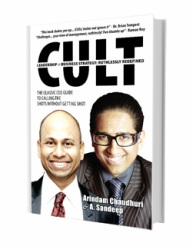
 RSS Feed
RSS Feed